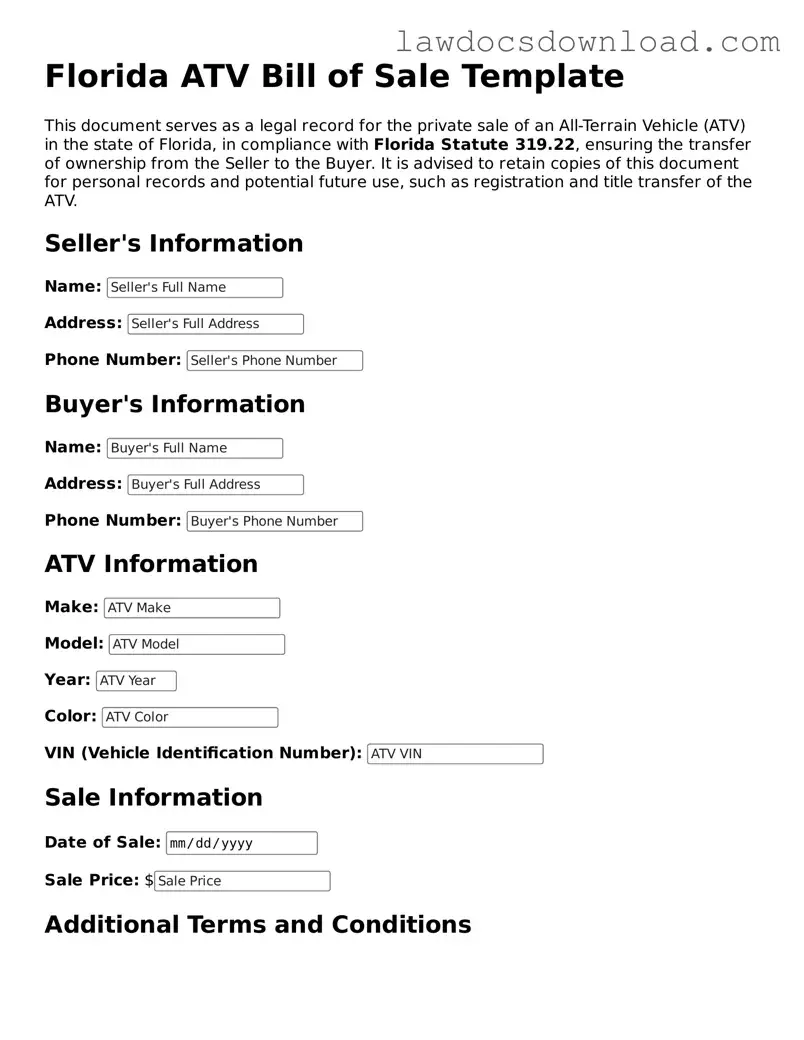The Florida ATV Bill of Sale form shares similarities with the Vehicle Bill of Sale form. Both serve as legal documents to record the sale and transfer of ownership from one party to another. They typically include details like the make, model, year, and VIN or serial number of the ATV or vehicle, as well as the sale price and the names and signatures of the buyer and seller. This documentation is often required for registration and taxation purposes.
Comparable to the Boat Bill of Sale form, the ATV Bill of Sale form documents the transaction between the buyer and seller, providing proof of transference of ownership. Both forms contain specific information about the item being sold, including serial numbers, make, model, and year. These documents also include agreement terms, buyer and seller details, and possibly notarization, depending on state requirements, to ensure the sale's legality and to facilitate the registration process.
Similar to the Motorcycle Bill of Sale form, the ATV Bill of Sale form includes essential information about the transaction, such as the make, model, and serial number of the motorcycle/ATV, alongside the details of both the buyer and seller. The primary purpose of both forms is to provide a legal record of the sale and change in ownership, helping to protect both parties in the event of future disputes regarding the transaction.
The Firearm Bill of Sale form bears resemblance to the ATV Bill of Sale form in that both serve as a legal document confirming the sale and ownership transfer of the item in question. These documents detail the item's specific characteristics, the sale price, and personal information about the buyer and seller, including signatures. Additionally, they play critical roles in proving ownership and may be required for registration or licensing.
Likewise, the General Bill of Sale form shares a purpose with the ATV Bill of Sale form. It acts as a physical record of the sale of various items, not limited to vehicles or ATVs, but could include electronics, furniture, or other personal property. It outlines the transaction details, including the sale date, buyer and seller information, and the sale amount, providing legal protection for both parties involved.
Resembling the ATV Bill of Sale form, the Trailer Bill of Sale form is specifically used to document the sale and transfer of ownership of a trailer. Both require information like make, model, year, and identification number, alongside transaction details such as the sale price and the parties' signatures. They assist in the legal and registration processes, ensuring the new ownership is recognized formally.
The Horse Bill of Sale form is another document similar to the ATV Bill of Sale form. While they pertain to different types of property (one for animals and the other for vehicles), both include detailed information about the sale item, sale price, and the parties involved. These documents also serve to protect legal rights and provide proof of ownership, which can be particularly important for liability and care disputes in the case of living animals.
Similarly, the Mobile Home Bill of Sale form parallels the ATV Bill of Sale form by providing proof of ownership transfer of a mobile home. This form includes specific details about the mobile home, such as manufacture year, make, model, and serial number, just as the ATV document describes the vehicle being sold. Both are pivotal for registration, taxation, and legal recognition of the new owner.
The Aircraft Bill of Sale form also aligns with the ATV Bill of Sale form. This specialized document focuses on the sale of airplanes and includes extensive details about the aircraft, the transaction, and the parties involved. Like the ATV Bill of Sale, it's essential for documenting ownership transfer, which is critical for registration with the appropriate aviation authorities and for maintaining accurate records.
Lastly, the Farm Equipment Bill of Sale form resembles the ATV Bill of Sale form in its function to document the sale and transfer of ownership of agricultural machinery and equipment. It lists details about the equipment being sold, such as the make, model, and condition, in addition to information about the buyer and seller. For both forms, having a detailed record of the sale is vital for tax, insurance, and legal purposes, confirming the transaction's legitimacy and offering protection to both parties involved.

